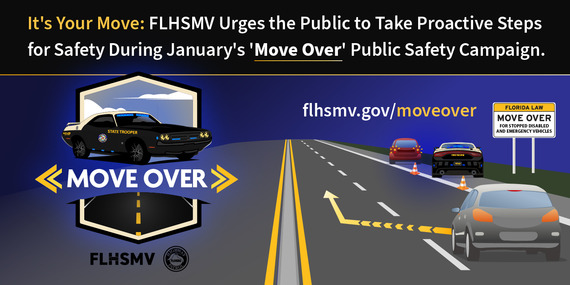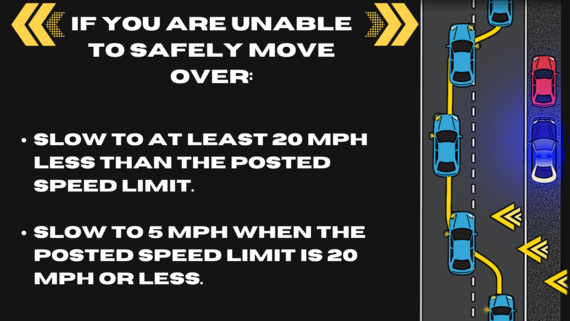It’s Your Move: FLHSMV Urges the Public to Take Proactive Steps for Safety During January’s ‘Move Over’ Public Safety Campaign


|
| January 2, 2025 |
| STATEWIDE NEWS RELEASE |
| FOR IMMEDIATE RELEASE |
| CONTACT: OFFICE OF COMMUNICATIONS |
| HSMV-MEDIA@FLHSMV.GOV |
It’s Your Move: FLHSMV Urges the Public to Take Proactive Steps for Safety During January’s ‘Move Over’ Public Safety Campaign |

|
TALLAHASSEE, FLA.– The Florida Department of Highway Safety and Motor Vehicles (FLHSMV), along with the Florida Highway Patrol (FHP), is partnering this January with the Florida Department of Transportation (FDOT), the Florida Sheriffs Association (FSA), the Florida Police Chiefs Association (FPCA), and AAA—The Auto Club Group- to educate drivers about Florida’s ‘Move Over’ law. At FLHSMV, we believe that public safety is a shared responsibility. By understanding the law, drivers can safely navigate the road when moving over for disabled vehicles or other vehicles positioned on the side of the roadway. This approach helps maintain the flow of traffic and ensures the safety of everyone on the road. Most drivers are aware of the Move Over Law, as every state has one. In Florida, the law was introduced in 1971, requiring motorists to move or yield right-of-way to emergency vehicles. The law has been amended over the years to make roads safer. In 2014, utility and sanitation vehicles were added. In 2021, road and bridge maintenance or construction vehicles displaying warning lights were also included. In 2024, the law was expanded to include moving over for all disabled vehicles on the side of the road that are stopped and display warning/hazard lights. If a driver can’t move over — or when on a two-lane highway — slow to a speed that is 20 mph or less than the posted speed limit. Slow down to 5 mph when the posted speed limit is 20 mph or less. Violating the Move Over law will result in a fine, fees, and points on your driving record. For more information, see section 316.126, Florida Statutes. “By understanding and respecting the move-over law, every driver can contribute to a safer environment,” said FLHSMV Executive Director Dave Kerner. “Safely changing lanes or slowing down when passing stopped vehicles not only protects lives but also reinforces our collective commitment to road safety. State Troopers have zero tolerance for these dangerous violations and will take enforcement action when a violation is observed.” “Safety is a shared responsibility. The Move Over Law emphasizes the important role each of us plays when we are behind the wheel,” said FHP Colonel Gary Howze II. “By doing our part—moving over or reducing our speed when passing a vehicle that is stopped on the side of the road—we not only protect those responding to incidents but also ensure the safety of all road users. This helps create a safe and secure environment for everyone throughout the Free State of Florida.” Moving over for ANY disabled vehicle on the side of the road, including law enforcement, emergency responders, and other service vehicles, is crucial for maintaining safety on Florida’s roadways. By moving over, those on the side of the road have the space needed to perform emergency vehicle maintenance, respond to crashes, assist those in distress, or conduct traffic management. This simple yet vital action not only helps prevent further incidents but also ensures that help can arrive quickly, potentially saving lives and reducing the overall impact of emergencies. Making room for these vehicles is not just a courtesy; it is a responsibility that every driver should uphold to protect responders and the community. |

|
|
“Getting everyone home safe is a shared mission that goes beyond engineering and enforcement. We need your help in making smart and safe decisions when you get behind the wheel,” said FDOT Secretary Jared W. Perdue, P.E. “As we start a near year, make a resolution to help protect our emergency responders and stranded motorists by moving over a lane when you see them and refrain from distracted driving. Help make everyone’s 2025 happy and safe.” “Ensuring the safety of our law enforcement officers is of utmost importance. The Move Over Law is vital in protecting those who risk their lives to keep our roads safe. By moving over or slowing down, drivers can significantly reduce the chances of tragic collisions, helping to ensure law enforcement officers make it home to their loved ones. We urge everyone to adhere to this law and help safeguard the lives of those who serve our communities,” stated Charlotte County Sheriff Bill Prummell, President of the Florida Sheriffs Association. “Our brave Florida officers and first responders do their best to provide protection to the thousands of drivers on Florida’s roads, so as we begin 2025, we would ask every motorist to join us in safeguarding those who dedicate their lives to protect us,” said Florida Police Chiefs Association President and Tampa International Airport Police Chief Charlie Vazquez. “If you see a police vehicle stopped on the shoulder of the road, please follow the law, and move over to show our Florida heroes that we respect them. Doing this keeps us all safer.” Move Over Safety TipsDisabled Motorists: • Always use caution. Always use caution when exiting or working on your vehicle. Do not step into the road or oncoming traffic, and never enter the roadway to flag down vehicles for assistance. • Never stop in the travel lanes. When possible, you should always exit the highway and park at a location where other drivers expect vehicles to be parked. If you are unable to stop in an optimal location, prioritize stopping on the right-hand shoulder as opposed to the left-hand shoulder. Avoid stopping at unsafe locations such as on a bridge. • Call your roadside assistance provider or a tow truck if necessary. Keep your seatbelt on! If you are involved in a crash, you can call *FHP (*347) on Florida’s highways for additional assistance. You can also call 911 if it is an emergency. Never exit your to flag down other motorists for assistance. DO NOT WALK INTO THE ROADWAY! • If it is unsafe to exit your vehicle, remain seated with your seatbelt on. If it is safe, make sure you exit your vehicle from the side facing opposite the roadway. Pay attention to vehicle traffic while making the necessary repairs and ensure you never enter the roadway while working on your vehicle.
Drivers: • Move over; it’s the law. If you cannot change lanes, you must slow down. The law specifies that if a driver can’t move over — or when on a two-lane highway — slow to a speed that is 20 mph or less than the posted speed limit. Slow down to 5 mph when the posted speed limit is 20 mph or less. • When you see an emergency or service vehicle with flashing lights, your immediate response should be safely moving over one lane. This creates a protective buffer for roadside workers. • Before changing lanes, assess the traffic around you. Ensure that the lane change can be made safely without putting yourself or other drivers at risk. • Look ahead for disabled vehicles or roadside personnel so you can slow down and approach cautiously. • Reduced visibility at night makes it more difficult to see vehicles stop in time, especially during inclement weather. Extra caution and heightened awareness are essential. • Stay focused on driving and remain alert. This is particularly important on highways, where vehicles are travel at higher speeds, and quick reactions are necessary. • Avoid multitasking while driving. Refrain from texting and other phone-related distractions. Be prepared for sudden stops or slow traffic, especially near accident scenes or where vehicles are pulled over. • Regularly check and maintain your vehicle’s headlights and windshield to ensure maximum visibility during nighttime driving. Throughout January, FHP Troopers will focus on educating the public about the Move Over Law and addressing non-compliance. They will engage with individuals and other motorists during their patrols. The public is encouraged to report aggressive or dangerous drivers by calling *FHP (*347).Information and data on Florida’s Move Over Law including downloadable campaign materials can be found on FLHSMV’s Move Over webpage. In addition to the awareness campaign, FLHSMV educates new and young drivers on the Move Over Law year-round with information in the Florida Driver Handbook and includes Move Over questions on the Florida driver knowledge exam. For more information on the Move Over crash and citation dashboard visit the FLHSMV Move Over Safety Center. |
| ### |
|
The Florida Department of Highway Safety and Motor Vehicles (FLHSMV) provides highway safety and security through excellence in service, education, and enforcement. Learn more on our website. The Florida Highway Patrol strives to achieve core values of courtesy, service, and protection. It is FHP’s job to help ensure the safety and welfare of millions of Florida’s residents and visitors every day. To learn more about FHP or how to become one of Florida’s Finest, visit BeATrooper.com |


